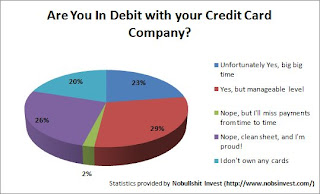
Credit card offers come in on a daily basis in the mailbox and it has been made way too easy for people to get credit. Nowadays, a lot of people use credit cards as a "crutch." If they can't afford something they really want, they will use it. Then when it comes time to paying the bill, they pay the minimum amount due only. So it accumulates an awful amount of interest and the next month when you get your bill, the balance is about the same. Due of that, credit cards should be used for emergencies only, unless you plan on paying the entire balance off immediately. There are some causes of credit card debt:
>>Missing Payments
The fastest way to get into credit difficulties is by not repaying the minimum payment required. Missed payments may result in the card being refused at retailers until payment is made. Worse still, this will affect the user’s credit rating. The solution is simple; set up a Direct Debit for the minimum amount and pay off as much of the remaining balance as possible to keep the debt low.
>>Spend, spend, spend
In fact, don’t, don’t, don’t. Spending on a credit card is borrowing money. It is a debt and must be repaid at some point. The smart card user only uses the card in place of cash, or to
 obtain a purchase they can afford, if they can pay off the cost over time. In other words, the smart card holder only spends what they can afford.
obtain a purchase they can afford, if they can pay off the cost over time. In other words, the smart card holder only spends what they can afford.>>The end of the honeymoon
Every special offer must come to an end, from 0% balance transfers to low introductory interest rates. When the special rate ends, the interest rates shoot up, and a small debt can grow rapidly, particularly if only the minimum repayments are being made. There is no point in being loyal to a card that has outlived its special rate; pay off the outstanding balance, or transfer it to a 0% balance rate, and get a new card with a lower rate for purchases.
 >>A Fistful of Cards?
>>A Fistful of Cards?Never hold more than eight cards at any one time, as this will adversely affect credit ratings. Clear any outstanding balances and cancel (in writing) cards that are no longer used.
Credit cards can prove a temptation too far, and soon they find themselves in debt. Simple precautions will keep the savvy card holder from such dangers. If debt is growing, there are some things card holders can prevent it immediately.
There are 7 steps that to help you Get Debt Under Control:
Step 1: Make a list of what you owe.
List your debts in order, starting with the largest balance. Next to the amount list the minimum monthly payment and the interest rate you are paying.
Step 2: Prioritize your repayments.
If you have one or two small balances, you might want to apply extra money to pay them off, while continuing the mimimums on the cards with the larger balances. Or you may want to pay off the card with the largest interest rate first.
Step 3: Eliminate credit cards and don't roll over balances.
When you pay off a card, notify the company that you want to close the account. Don't just stick the card back in your wallet where you will be tempted to use it.Don't roll over balances from card to card. Switching  from card to card has drawbacks. Every time you get a new card you're generating an outstanding open line of credit that will appear on your credit report. Other lenders may be unwilling to let you keep rolling balances. And when those tempting introductory rates expire, you could be stuck with huge balances on high rate cards.
from card to card has drawbacks. Every time you get a new card you're generating an outstanding open line of credit that will appear on your credit report. Other lenders may be unwilling to let you keep rolling balances. And when those tempting introductory rates expire, you could be stuck with huge balances on high rate cards.
 from card to card has drawbacks. Every time you get a new card you're generating an outstanding open line of credit that will appear on your credit report. Other lenders may be unwilling to let you keep rolling balances. And when those tempting introductory rates expire, you could be stuck with huge balances on high rate cards.
from card to card has drawbacks. Every time you get a new card you're generating an outstanding open line of credit that will appear on your credit report. Other lenders may be unwilling to let you keep rolling balances. And when those tempting introductory rates expire, you could be stuck with huge balances on high rate cards. Step 4: Get a copy of your credit report.
Your credit report is your bill-paying history. Check for errors and contact merchants if you have questions. You are entitled to a free credit report if you have been turned down for a loan or a credit card.

Step 5: Make a spending plan.
Now is the time to change how you spend money. Track the money that is coming in and going out. Personal finance software such as Quicken or Microsoft Money let you track all your check writing by category and make monthly comparisons of your actual spending to the amount you budgeted. Use a debit card instead of a credit card. You can only use the card if you have the money in the account to cover it.
Step 6: Be careful about the equity in your home.
In the past few years, Americans have withdrawn billions of dollars worth of equity in their homes. But there are dangers in home equity loans. Frequently the money is used to pay down credit cards, which are then charged up again. Home values to rise but there is no guarantee that it will continue in the area where you live.
Step 7: Get help.
If you feel that your credit has gotten out of your control contact a professional for help. Be careful to avoid companies that want a fee for their services or money up front. Seek out non-profit credit counseling services such as Consumer Credit Counseling Services.


0 comments:
Post a Comment